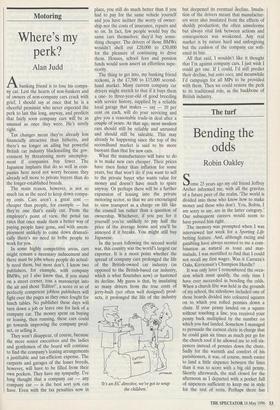Motoring
Where's my perk?
Alan Judd
Abanking friend is to lose his compa- ny car. Lest the hearts of non-bankers and of owners of non-company cars crack with grief, I should say at once that he is a cheerful pessimist who never expected the perk to last this long, anyway, and predicts that fairly soon company cars will be as unusual as once they were. He's surely right. Tax changes mean they're already less financially attractive than hitherto, and there's no longer an ailing but powerful British car industry blackmailing the gov- ernment by threatening more unemploy- ment if companies buy fewer. The Japanese implants that do so well in com- panies here need not worry because they already sell more to private buyers than do the longer-established breeds.
The main reason, however, is not so much tax as the need to keep down compa- ny costs. Cars aren't a great cost cheaper than people, for example — but they're one that's easily cut. From the employer's point of view, the penal tax rates that once made them a better way of paying people have gone, and with unem- ployment unlikely to come down dramati- cally there's no need to bribe people to work for you.
In some highly competitive areas, cars might remain a necessary inducement and there must be jobs where people do actual- ly need them, but most don't. I know two publishers, for example, with company BMWs, yet I also know that, if you stand on a street corner, toss a manuscript into the air and shout `Editor!', a score or so of perfectly competent jobless publishers will fight over the pages as they once fought for lunch tables. No publisher these days will turn down a job or leave one for lack of a company car. The money spent on buying or leasing, then running, these cars could go towards improving the company prod- uct, or selling it. They won't disappear, of course, because the more senior executives and the ladies and gentlemen of the board will continue to find the company's leasing arrangements a justifiable and tax-efficient expense. The carports and garages of the lesser breeds, however, will have to be filled from their own pockets. They have my sympathy. I've long thought that a company car — any company car — is the' best sort you can have. Even with the tax penalties now in place, you still do much better than if you had to pay for the same vehicle yourself and you have neither the worry of owner- ship nor the costs of insurance, repairs and so on. In fact, few people would buy the same cars themselves; they'd buy some- thing cheaper. The drivers of those BMWs wouldn't shell out £20,000 to £30,000 for the pleasure of continuing to drive them. Houses, school fees and pension funds would soon assert an effortless supe- riority.
The thing to get into, my banking friend reckons, is the £7,500 to £15,000 second- hand market. Many current company car drivers might stretch to that if it buys them a one- to three-year-old of good breeding with service history, supplied by a reliable local garage that makes — say — 10 per cent on each, will do your servicing and give you a reasonable trade-in deal after a couple of years. At that age, most modern cars should still be reliable and unrusted and should still be saleable. This may already be happening since the top of the secondhand market is said to be more buoyant than that for new cars.
What the manufacturers will have to do is to make new cars cheaper. Their prices have risen faster than inflation for some years, but that won't do if you want to sell to the private buyer who wants value for money and doesn't have much to spare anyway. Or perhaps there will be a further expansion of leasing into the private motoring sector, so that we are encouraged to view transport as a charge on life like the council tax rather than a question of ownership. Whichever, if you pay for it yourself you're unlikely to pay half the price of the average house and you'll be annoyed if it breaks. You might still buy Japanese.
In the years following the second world war, this country was the world's largest car exporter. It is a moot point whether the spread of company cars prolonged the life of the British-owned car industry (as opposed to the British-based car industry, which is what flourishes now) or hastened its decline. My guess is that, by insulating so many drivers from the true costs of jerry-built (yet often well designed) prod- ucts, it prolonged the life of the industry It's an EC directive, we've got to wrap the children.' but deepened its eventual decline. Insula- tion of the drivers meant that manufactur- ers were also insulated from the effects of shoddy production; the often unwelcome but always vital link between actions and consequences was weakened. Any real market is by nature hard and unforgiving but the cushion of the company car soft- ened its bite.
All that said, I wouldn't like it thought that I'm against company cars. I just wish I could get one. If I could, I'd still predict their decline, but sotto voce, and meanwhile I'd campaign for all MPs to be provided with them. Then we could restore the perk to its traditional role, as the backbone of British industry.


































































 Previous page
Previous page